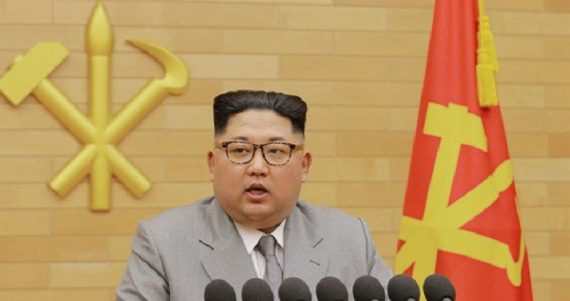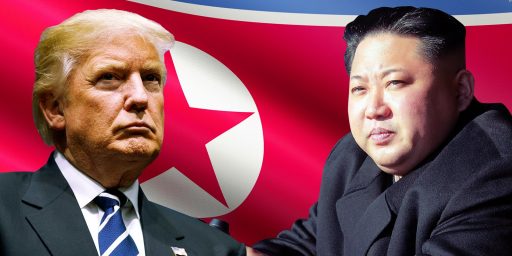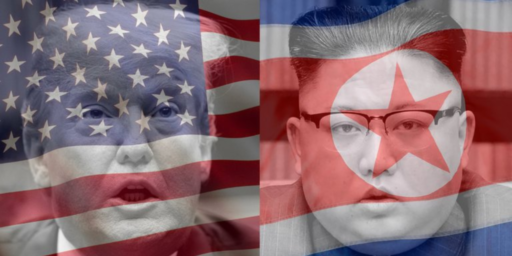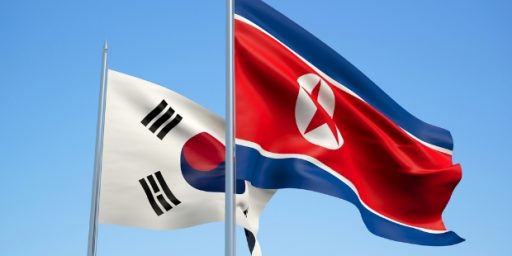Kim Jong-Un Extends Olive Branch To The South
North Korean leader Kim Jong-Un is extending an olive branch of sorts to South Korea while simultaneously claiming success in achieving a nuclear deterrent.
In a speech yesterday that seemed designed more for foreign consumption than it was for his own people, North Korean leader Kim Jong-Un extended an olive branch of sorts to the DPRK’s neighbor to the south while asserting the same largely belligerent tone toward the United States. While asserting during the speech that the DPRK had succeeded in creating a sufficient nuclear deterrent and warning the United States and its allies that inciting military action against North Korea could have disastrous implications, Kim also suggested a rapprochement of sorts with the south in advance of the 2018 Winter Olympics, which will take place in South Korea beginning early next month. Today, the President of South Korea responded with his own proposal for talks between the two nation that would discuss the possibility of North Korean participation in the Olympics and possibly other issues:
SEOUL, South Korea — South Korea on Tuesday proposed holding high-level talks with North Korea on their border next week, a day after North Korea’s leader, Kim Jong-un, suggested inter-Korean dialogue to discuss easing military tensions and his country’s participation in the Winter Olympics in the South.
Cho Myoung-gyon, the South’s point man on the North, proposed that the two Korean governments hold their meeting next Tuesday in Panmunjom, a village straddling the inter-Korean border north of Seoul, the South Korean capital.
“We hope the two sides sit down for frank talks,” Mr. Cho, the unification minister, said in a news conference.
If the North responds positively, it will set in motion the first official dialogue between the two Koreas in two years. South Korean officials hope the talks will lead to a thaw on the divided peninsula after years of high tensions and threats of war over the North’s pursuit of nuclear weapons. But analysts cautioned that a sudden move to improve ties between the two Koreas could strain relations between Seoul and Washington.
Panmunjom has long served as a contact point for the two Koreas, with both sides exchanging messages through a telephone hotline there. But the North has not used the hotline since Mr. Moon’s conservative predecessor, the impeached President Park Geun-hye, shut down a joint industrial complex in the North Korean town of Kaesong in early 2016.
On Tuesday, Mr. Cho urged the North to restore the hotline so that both sides could discuss the agenda for the high-level talks. The two governments held their last high-level dialogue in December 2015.
North Korea’s offer to send a delegation to the Winter Olympics, which are to begin in February in the South Korean town of Pyeongchang, represented a breakthrough for President Moon Jae-in of South Korea, a dogged champion of dialogue and reconciliation with the North.
Mr. Moon has repeatedly urged North Korea to join the Pyeongchang Olympics, hoping it would ease the military tensions over the North’s nuclear and missile programs. Mr. Moon said that the North’s participation would compel the two Koreas to open talks, which he hoped would lead to broader negotiations, involving Washington and others, for the North’s denuclearization.
After ignoring Mr. Moon for months, calling his South Korean government an American stooge, Mr. Kim used his New Year’s speech on Monday to embrace the South Korean leader’s overture.
“I appreciate and welcome the North’s positive response to our proposal that the Pyeongchang Olympics should be used as a turning point in improving South-North relations and promoting peace,” Mr. Moon said early Tuesday, instructing his cabinet to move swiftly to open dialogue with North Korea.
With barely 40 days before the Olympics, the two Koreas must swiftly sort out logistics and other details for North Korean athletes if they are allowed to participate, officials said.
South Korea has proposed that the North Korean athletes travel through the 2.5-mile-wide Demilitarized Zone, the world’s most heavily fortified border, a route that would be rich in symbolism. It also wants to discuss the possibility of the two Korean delegations marching together in the Games’ opening ceremony. It also wants to know whether the North plans to send a cheering squad.
If the North participates in the Games and the two Koreas march together, it would be a milestone in inter-Korean relations.
Strong ethnic nationalism compels people in one Korea to cheer for the other in competition with any other country, especially Japan, which once ruled the Korean Peninsula as a colony. The potential implications of millions of Koreans cheering together could be huge — a prospect that could further advance Mr. Moon’s policy of promoting dialogue and exchanges with the North and creating a thaw after years of tensions spurred by the North’s nuclear and missile tests.
Athletes from the two Koreas marching together into the stadium during the opening ceremony would not be an unprecedented event. The same thing happened at the 2000 Summer Olympics and again at the 2004 Olympics in Athens. Those events, of course, took place nearly a decade because Kim Jong-Un became the leader of the DPRK after the death of his father and before North Korea began to ramp up its nuclear weapons research and ballistic missile testing programs and undertook what has been several years of increasingly belligerent rhetoric promising everything from all-out war on the peninsula to nuclear attacks on the United States. In that respect, this latest and seemingly more conciliatory tone toward the south is interesting, to say the least. On the one hand, Kim is continuing to maintain a confrontational tone with the United States while becoming far less confrontational with Seoul.
As New York Times reporters Choe Sang-Hun and David Sanger note in a lengthy analysis piece posted yesterday, though, there is clearly a certain logic to this new tone on his part:
Beyond a New Year’s declaration by North Korea’s leader, Kim Jong-un, that he would move to the mass production of nuclear weapons and intercontinental missiles in 2018 lies a canny new strategy to initiate direct talks with South Korea in the hope of driving a wedge into its seven-decade alliance with the United States.
Mr. Kim, perhaps sensing the simmering tension between President Trump and President Moon Jae-in of South Korea, called for an urgent dialogue between the two Koreas before the opening of the Winter Olympics in the South next month.
The strained relationship between the allies has been playing out for months, as Mr. Moon, a liberal, argued for economic and diplomatic openings with the North, even as Mr. Trump has worked hard to squeeze the North with increasingly punishing sanctions. Mr. Moon also angered Mr. Trump and his aides in recent months by suggesting he holds what he called a veto over any American pre-emptive military action against the North’s nuclear program.
Until now Mr. Kim has largely ignored Mr. Moon, whom the North Korean media has portrayed as a spineless lackey of the United States. But the dramatic shift in tone and policy, toward bilateral talks between the two Koreas, suggests that Mr. Kim sees an opportunity to develop and accentuate the split between Mr. Moon and Mr. Trump, betting that the United States will be unable to mount greater pressure on the North if it does not have South Korean acquiescence.
(…)
The overture to the South came just days after Washington rallied its allies and rivals in the United Nations to support another round of tough sanctions against North Korea.
Even before that China had drastically cut back on direct shipments of oil and refined petroleum products that go through its pipeline to North Korea, American officials say, and there are reports of fuel shortages. Gas prices have more than doubled in the past year.
As Washington has campaigned for North Korea’s isolation, a number of nations — including Mexico, Peru, Kuwait, Myanmar, Spain, Italy and Germany — have recently expelled North Korean ambassadors or reduced the number of North Korean diplomats in their countries. And nations like the United Arab Emirates, Kuwait and Qatar have also begun phasing out North Korean workers toiling in construction sites there to earn badly needed cash for the North Korean government.
Mr. Moon officially supports the enforcement of United Nations sanctions as a tool to bring the North to nuclear disarmament talks. In recent weeks, his government has seized two oil tankers on the suspicion that they were used in violation of sanctions to smuggle refined petroleum products into North Korea through ship-to-ship transfers on the high seas.
But Mr. Moon also agrees with China and Russia that talks are needed to resolve the nuclear crisis. Mr. Kim’s sudden peace overture on Monday will probably encourage both Russia and China to renew their calls for some kind of “freeze for freeze” — a freeze on North Korean tests in return for a freeze on all American-South Korean military exercises. Presumably, under that situation sanctions would begin to ease.
“After getting nowhere with the Americans, North Korea is now trying to start talks with South Korea first and then use that as a channel to start dialogue with the United States,” said Yang Moo-jin, a professor at the University of North Korean Studies in Seoul, who considered the North’s overture a positive development for easing tensions.
While Kim’s moves are unlikely to drive a permanent wedge between the United States and its South Korean ally, they clearly seem designed to exploit the tensions that exist between the United States and its desire to increase the pressure on the DPRK and a South Korea led by a President who campaigned in part on a platform that included promises to attempt to cool down tensions on the peninsula. During the Presidential campaign made necessary last year by the impeachment of former President Park Geun-Hye on corruption and other charges, President Moon based a large part of his successful campaign on the promise that if elected he would seek to ease tensions with the DPRK. Initially, however, those plans were pushed to the side in the wake of a sixth nuclear test explosion, repeatedly successful tests of ballistic missiles, and incendiary rhetoric aimed at South Korea, Japan, and the United States. Given that, it’s not entirely surprising that President Moon would be open to the overture that Kim put on the table yesterday.
What impact all of this may have on the situation on the Korean peninsula remains to be seen, of course. Despite his claims yesterday, it’s fairly clear that Kim Jong-Un hasn’t quite achieved the level of nuclear deterrence that would put it on a bar with even the most junior members of the so-called “nuclear club.” As has been noted before, though, North Korea doesn’t necessarily need a massive nuclear deterrent to make things difficult for the United States and ward off a potential pre-emptive strike. For years, the DPRK has had a sufficient level of non-nuclear power that could be employed in response to any attack, including but not limited to tens of thousands of rocket and artillery pieces capable of reaching civilian targets like Seoul as well as American military bases in South Korea and Japan. That capability alone likely serves as a sufficient deterrent in all but the most extreme circumstances. Nonetheless, the move to ease tensions with the south at this time is a smart political move by Kim since it plays to both the platform that President Moon ran on last year and the unease that many have noted among South Korea civilians over the possibility of a war that would bring them nothing but hardship and suffering. Whether it all leads to an easing of the international pressure on the DPRK, of course, is another story.






I’ll say this for Trump: his incompetence and lunacy seems to making the rest of the world ask more rationally to compensates. That’s … something, I guess.
Trump is in danger of being badly outplayed by a guy we insist on calling ‘crazy.’
Our position in Asia rests on an approach begun with the occupation of Japan. We act in our own interests, but pull our punches. We support international solutions, we seek to influence but not control. In short we have been, on balance, a relatively restrained and decent ’empire.’ More Cyrus the Great than Attila.
Since the end of WW2 we have kept the waterways free, outmaneuvered the Soviets and the PRC by establishing and maintaining a ring of island strong points, as well as keeping significant forces in Japan and South Korea. We have allowed Japan and SK to live under our nuclear umbrella, thus blocking the nuclearization of those two nations.
None of this has made us beloved, but it has made us respected, often admired and, to a greater extent than is typical with overweening powers, we have earned trust.
When 46% of Americas voted to elect a treasonous, criminal dotard, we sent a shock wave throughout the world. Suddenly good old reliable US of A looked like an unstable banana republic. So yes, we are now vulnerable to challenges to our relationship with South Korea. We’ve gone from protector of the peace to unstable instigator of war – war that would devastate South Korea. The South Korean government would be irresponsible if it rejected an offer of easing from the Kim regime.
This is interesting because the previous approach of Kim’s father seemed to have been to demand negotiations that would have had the US imposing a unilaterally resolution on SK and the other negotiating partners. Jong-eun’s gambit could reverse the tactic by opening the possibility of SK unilaterally imposing such a settlement. Moon Jae-in is Kim’s best chance to achieve this type of an advance, as well as the best chance for ending the counter attack against NK military exercise that has been the focus of significant attention from both sides and can easily be interpreted as overly provocative. Moon may be the most foreign policy oriented guy the Koreans will be willing to elect for some time and also the least conservative.
@michael reynolds: I disagree, Trump has already been badly outplayed by Kim, at least partially because we insist on seeing him as crazy.
@michael reynolds: A wonderful rant!
One little thing: 46% of Americans who voted are the responsible party. Significantly different from 46% of all Americans.
My tendency toward being a prick about that sorta thing goes on all the time. This little bit of pedantry has some meaning, I think.
And in regards to the original post: Did I miss that paragraph in which we remembered that President Trump tweeted very nasty things about ROK imports and trade balance and threatened to destroy the US – SKorean trade arrangement?
Now in unison lets all thank God and James Pearce that no one believes in tweets. Cause tweets are dumb. And can’t have consequences.
@michael reynolds:
Yes, but he did win thee mythical “War on Christmas”, and personally prevented any airline crashes in 2017. So really, how much more can you ask of the guy?
Imagine if you would : Donald Trump wakes up tomorrow and he is now the Supreme Leader of North Korea.
Would Trump ever consider giving up his nuclear arsenal? Ever?
The Kim’s have used the North’s ability to shell and bombard Seoul as a BIG deterrent against attack. Of course a minor thaw with the South doesn’t remove the option, but I wonder whether things are headed in that direction. Trump’s about the only Western leader capable of making tyrannical despots look good; at least he seldom alienates them as bad as America’s allies.
We. Are. So. Fvcked.